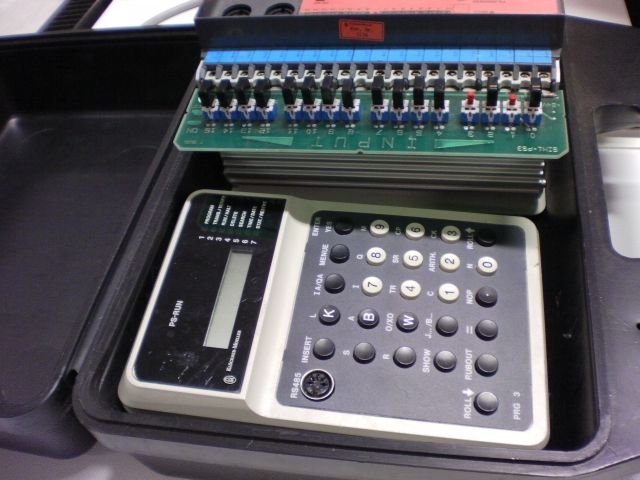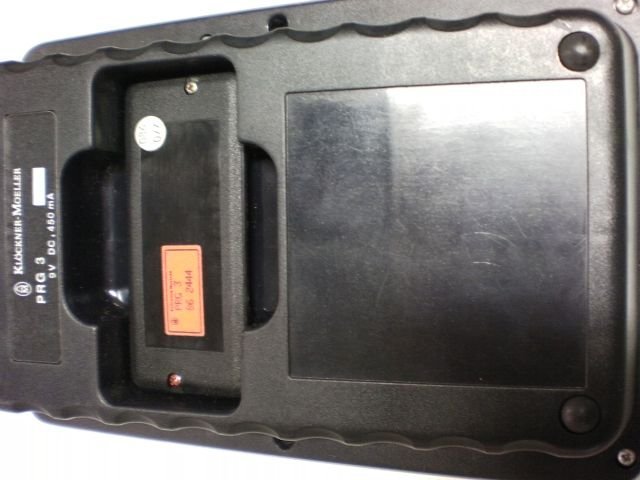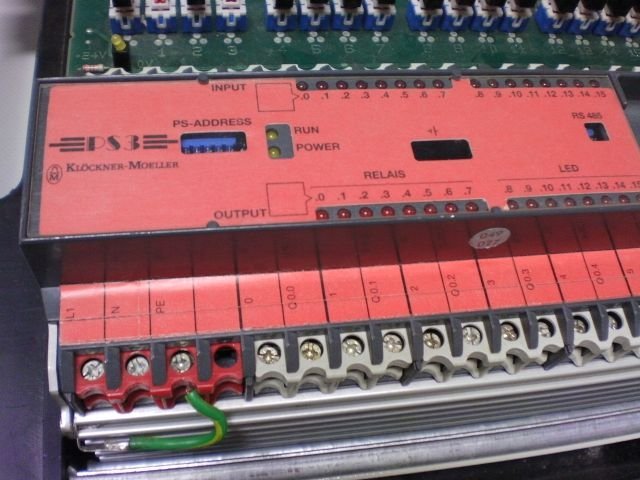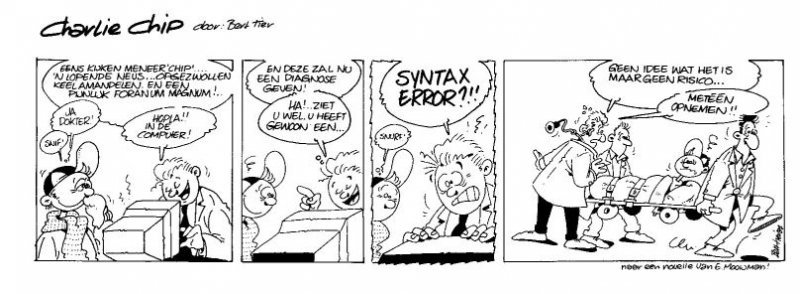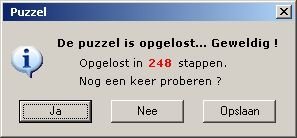Keetie
Users-
Aantal items
2687 -
Registratiedatum
-
Laatst bezocht
Inhoudstype
Profielen
Forums
Galerij
Kalender
Alles dat geplaatst werd door Keetie
-
Dus ik had gelijk: het eerste programmaatje kon niet werken. Ik miste de uitvoeropdrachten. Deemster, ben jij Danny?
-
Vertel me dan maar hoe het werkt. Die commando's had ik wel gelezen, maar hoe worden ze uitgevoerd?
-
Bij de kringloop met de vreemde dingen lag er weer eentje voor 7 euro 50. Wat dat nou weer was? achterkant Het linker kastje is heel licht, dat rode ding heel zwaar. Met het zoeken op de naam Kloeckner-Moeller kwamen we al een heel eind. Uiteindelijk bleek het om een PLC Programmer te gaan (Programmable Logic Controller), een programmeerbare schakel-unit. Mogelijk is dit ooit in een verkeerslicht stuurkast gebruikt ... ?
-
Norton Commander!!! Gebruik ik ook nog met DOS. En vergeet Salamander niet, DE Norton Commander voor Windows. Die adventures zullen wel arcade adventures zijn? Ook welkom.
-
In het verleden had ik ook een lijst gevonden met nogal onbekende programmeertalen: Little Known Computer Languages Author Unknown -- PASCAL, FORTRAN, COBOL, and BASIC -- These languages are well known and more or less well used throughout the computing industry. There are also numerous other languages, however, which are less well known, yet still have there ardent devotees. In fact many of these little known languages have the most ardent of devotees. For those who wish to know more about these obscure languages --- and why they are obscure --- the following catalog is presented. --SIMPLE-- SIMPLE is an acronym for Sheer Idiots Monopurpose Programming Linguistic Environment. This language, developed at the Hanover College for Technological Misfits, was designed to make it impossible to write code with errors in it. The statements are, therefore, confined to BEGIN, END, and STOP. No matter how you you arrange the statements, you cannot make a syntax error. --SLOBOL-- SLOBOL is best known for the speed, or lack of it. Although many compilers allow you to take a coffee break while they compile, SLOBOL compilers allow you to travel to Bolivia to pick the coffee. Three or four programmers are known to have died of boredom sitting at their terminals while waiting for a SLOBOL program to compile. Weary SLOBOL programmers often try to return to a related, but infinitely faster language, COCAINE. --VALGOL-- From its modest beginnings in Southern California's San Fernando Valley, VALGOL is enjoying a dramatic surge of popularity across the industry. VALGOL commands include REALLY, LIKE, and Y'KNOW. Variables are assigned with the =LIKE and =TOTALLY operators. Other operators include the 'California Booleans' FERSURE and NOWAY. Repititions of code are handled in FERSURE loops. Here is an example of a VALGOL program: LIKE, Y'KNOW {IMEAN} START IF A = LIKE BITCHEN AND B = LIKE TUBULAR AND C = LIKE GRODY ** MAX {FERSURE} ** 2 THEN FOR I = LIKE 1 TO OH-MAYBE 100 DO WAH + {DITTY ** 2} BARF{I} = TOTALLY GROSS{OUT} SURE LIKE BAG THIS PROGRAM REALLY LIKE TOTALLY {Y'KNOW} VALGOL is also characterized by it unfriendly error messages. For example, when the user makes a syntax error, the interpreter displays the message GAG ME WITH A SPOON. --LAIDBACK-- Historically, VALGOL is a derivative of LAIDBACK, which was developed at the (now defunct) Marin County Center For T'ai Chi, Mellowness and Computer Programming, as an alternative to the more intense atmosphere in nearby Silicon Valley. The Center was ideal for programmers who liked to soak in hot tubs while they worked. Unfortunately, few programmers could survive there for very long, since the Center outlawed pizza and RC Cola in favor of bean curd and Perrier water. Many programmers mourn the demise of LAIDBACK because of its reputation as a gentle and non-threatening language. For example, LAIDBACK responded to syntax errors with the message: SORRY, MAN, I CAN'T DEAL WITH THAT. --SARTRE-- Named after the late existential philosopher, SARTRE is an extremely unstructured language. Statements in SARTRE have no purpose or meaning, they just are. Thus SARTRE programs are entered and left to define their own functions. SARTRE programmers tend to be boring, depressed, and are no fun at parties. --FIFTH-- FIFTH is a precision mathematical language in which the data types refer to quantity. The data types range from CC, OUNCE, SHOT and JIGGER to FIFTH (hence the name of the language), LITER, MAGNUM and BLOTTO. Commands refer to characters manipulated by the programmer, such as CHABLIS, CHARDONNAY, CABERNAY, GIN, VERMOUTH, VODKA, SCOTCH and WHATEVERSAROUND. The many versions of the FIFTH language reflect the sophistication and status of the various users groups. Commands in the ELITE dialect include VSOR and LAFITE, while the GUTTER dialect includes HOOTCH and RIPPLE. The latter dialect is a favorite of frustrated FORTH programmers who often end up devoting a great deal of effort on becoming end-users of this language. --C-- This language was named for the grade recieved by its author when it was submitted as a class project in computer science. C is best described as a low level programming language. In fact, most C programs require more statements than machine language. In this respect it bears a strong resemblance to COBOL. --LITHP-- This otherwise unremarkeable language is distinguished by it absence of an "S" in the character set. Programmers must instead substitute "TH". LITHP is said to be ustheful in prothething lithps. The language was for a time considered as the standard for Taiwanese computers, since the absence of "S" would allow the manufacturer to save a small amount of manufacturing costs. --DOGO-- Developed at the Massachusetts Institute of Obedience Training, DOGO heralds a new era of computer literate pets. DOGO commands include SIT, STAY, HEEL, and ROLL_OVER. An innovative feature of DOGO is "puppy graphics", a small cocker spaniel that occasionally leaves a deposit as he travels across the screen. This is considered the de-facto language for writing Fido BBS programs. --FOCUSALL-- This language is design to run on small computers with minimal memory. For this reason, Commodore machines were originally considered, but declined because of the lack of a paper tape reader. It is only distributed on paper tape, for loading from an ASR-33 teletype. Loading takes about 20 minutes, after which the user is greeted by the message CONGRATULATIONS, YOU HAVE LOADED FOCUSALL! The interpreter is then ready to execute any available command. The only available command is LOAD FOCUSALL, which causes the system to once again load the interpreter from paper tape. This operating system is recommended for frustrated Commodore users; when this system has been run several hundred times without error, the user is ready to graduate to Commodore operation, which has a similar disk operating system. The real power of the language comes from the fact that preceeding a command with a line number causes it to be stored and executed in sequence later as in the following example: 100 LOAD FOCUSALL 200 LOAD FOCUSALL 300 LOAD FOCUSALL . . The pronunciation of the name of the language is actually more flexible than the language itself would appear to be; it is pronounced according to your mood at the moment. Actually, the name came from a combination of FOCAL and the habit that optics lab types have had for refering to a lead engineer as a "Focus Man" (ie. "Person"). Someone would then chime in "Yeah, and he'll focus every chance he gets!" --FASTBOL-- This language is more commonly refered to as QUICKIE. Error messages include the very common "COMPUTUS INTERUPTUS". A closely related language is MOONER. --GEROTOL-- This language is characterized by the habits of its ardent users. Instructions frequently forget their function while executing and finally conclude with the "I USED TO KNOW THAT" condition code. Loops tend to repeat frequently at sporadic intervals, even when not initiated.
-
Lijkt wel wat op een Startrek game, daar heb ik ook een hele verzameling van, oude versies dan. Zo te zien is jouw voorbeeld - waar volgens mij iedereen aan meewerkt (public), nog niet af, dus nog geen resultaat te zien ...
-
Heb even gezocht en ik weet het weer. In het verleden heb ik een tekstadventure getest geschreven in brainfuck, waarbij ik toen het idee had dat het een beetje op basic leek.
-
Nah, ik lees "Hallo Retroforum". Zulke voorbeelden had ik eigenlijk van Deemster verwacht.
-
De naam kende ik wel, maar het hoe, wat en waar ben ik vergeten. Zit ergens in mijn geheugen verscholen.
-
Nee, hoor. Het resultaat.
-
-
Het gaat niet om de 'listing', maar wat je ermee bereikt, vind ik.
-
Ja, je bent in vorm!
-
[FOTO]wedstrijd - algemeen (stemtopic)
Keetie reageerde op het topic van Keetie in ID Contests archief
Daar ik totaal geen reactie heb gekregen over foto nr 4 - er is geen originele foto opgestuurd, daarom blijft de al dan niet bewerkte foto twijfel en zoals VR!DZ al opmerkt aan een leeg profiel is weinig eer te behalen - wordt deze foto, ook al stond hij voor in de stemming, gediskwalificeerd. Ross en Hinse mogen opnieuw hun stem uitbrengen (ik weet niet hoe dat geregeld moet worden) en wie nog niet gestemd heeft krijgt de kans nog tot en met 15 september 2013. -
Welke versie van Visual Basic heb je het over? Volgens mijn man worden er in VB wel degelijk Basic commando's gebruikt als FOR ... NEXT, IF ... THEN , etc. En dat knoppen en formpjes slepen naar het scherm zag ik ook zo voor me, maar die knoppen en formpjes moeten wel degelijk gevuld worden, anders heb je gewoon een lege schil.
-
Ja, ja, ik had hem gewoon bijna geraden ... De R
-
De Beeld en Geluid Retro Game Experience - 14 & 15 september
Keetie reageerde op het topic van Gyruss in Retro evenementen
Goed gekeurd! Nou moet ik opeens aan die autobahn denken... -
Natuurlijk is het allemaal niet eerlijk, dit voorwerp wordt niet door iedereen gebruikt...
-
Nee, nee. Ook niet.
-
De Beeld en Geluid Retro Game Experience - 14 & 15 september
Keetie reageerde op het topic van Gyruss in Retro evenementen
Ik durf het niet te zeggen, daarom fluister ik het maar ... <fluister> Er staat ook een klein stukje over in de vprogids van volgende week; het artikel zelf gaat over chiptunes (blz20) </fluister> -
Ik geloof in de hint: E
-
Mooi topic. Basic begrijp ik wel ietsje van, vroeger heb ik BBC Basic een beetje uitgeplozen. Visual Studio is zeker een opvolger van Visual Basic?
-
Klopt helemaal. Ook al had ik het over struikelen gehad, ik vond het een te mooi woord om te laten liggen.

